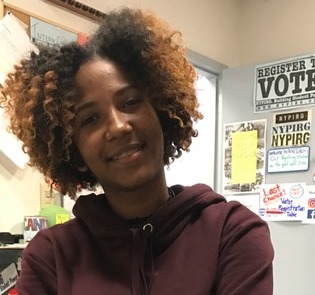Posts Tagged ‘first-generation student’
I’m a junior majoring in Sociology. My future plans include graduate school to become a clinical therapist. I value all the resources available to be able to gain the skills necessary to further my career.
I am able to attend college through financial aid, including TAP and a Pell grant. I’m a first generation student, so furthering my education is more of a community achievement than anything else. Although I receive financial aid I have sought part-time employment to aid with my many expenses i.e food, bills, clothes, etc. I was unable, however, due to my heavy class load of 5 classes per semester. This class load is essential in order to receive the TAP and Pell grants which cap after four years.
A fully funded CUNY is fundamental to not only the success of thousands of students but the economy as a whole.


I’m currently a junior studying Sociology at SUNY Cortland. After graduation, I hope to attend graduate school near home and to find a part-time job. I receive scholarship help like TAP and Pell Grants. I support myself financially, so I work during my summers and during the school year to pay for textbooks and to pay for my food costs because I don’t receive any support for food like SNAP.
I am very thankful as a first-generation student to be able to go to college. College is still expensive even with all these financial aid grants, but everyday I work hard to be a better person and make my parents proud, so at the end of the day everything is worth it.
If SUNY were fully-funded, then students could focus on classes. Financial stability for some students can be very stressful which can impact how they do in school. One of the biggest challenges was adjusting to the distance from Cortland to my hometown and fitting in, since Cortland does not have a very big Latin community.


I am a sophomore studying criminal justice that wants to go to John Jay. I receive the Tuition Assistance Program (TAP)award and the Pell Grant and I am part of the ASAP program. Since ASAP covers textbooks and metrocard, I can use Pell for food and other bills. I also have a paid internship with a cadet which helps me pay for some of the textbooks that don’t get covered through ASAP. I am the first person in my family to go to college, my family is from Ecuador. If I didn’t get financial aid I would have gone to the army because they pay for college. I was part of CUNY Start originally and it helped me get through remedial classes by offering textbooks and advisers for much cheaper. I would have liked to be in the ACE program at John Jay but it doesn’t cover transfer students. I will probably rent textbooks when I transfer. I’ve been looking for internships for credit so that I graduate on time at John Jay and don’t run out of my financial aid.



I am a freshman psychology major. I would like to eventually work at a school and work with teenagers or do social work. I receive the Tuition Assistance Program (TAP) and the Pell Grant and I am looking for a job to pay for the bus, food and clothes. I didn’t qualify for ASAP because they said I had too many remedial courses. But I had taken those classes in the summer already. When I went to try again to appeal, the spots in ASAP were already filled up. If I was able to get into ASAP I would get my metrocard covered which would be a huge help. I am the first person in my family to go to college. My family and I are from the Dominican Republic. If I didn’t get financial aid I’d have to take out loans. I am trying to work to save money in case there is a semester that I don’t get enough financial aid.



After losing my father in high school, I didn’t realize I’d have to lean so heavily on my mother for assistance. No one in my family has been able to achieve a four-year degree yet. That has been my motivation to work hard to make them proud. My mother wisely invested in a savings account for my education, unfortunately the funds only partially cover the costs for the first two years of SUNY Cortland and the costs only seem to be going up.
I work full-time over the summers at an assisted living center and was fortunate enough to secure one of the limited spots in the Work Study Program to put towards the costs of living at Cortland. While it is difficult to keep up with the expense of food, transportation and other unavoidable essentials, I am thankful to have been accepted into work-study because it helps reduce my tuition costs and enables me to have some extra cash during the semester.



Understanding my mother’s struggle to get an education, makes it clear that I would not be able to pay for college if I did not qualify for financial aid like the Tuition Assistance Program (TAP). Although my mother’s experience differs from mine, I know if she had access to opportunity programs or financial aid to help her pay for education, she would have finished. I recently quit one of the two jobs I had at the beginning of the semester because my jobs were taking a toll on my academic performance. It is stressful to manage time when you constantly must decide on whether you need to work to have money to pay for groceries or to use that time to study for an upcoming exam
As first-generation college students, my mother always encouraged my siblings and I to continue with our education to have a financially stable future, nothing like what we experienced as children. My mother valued the little education she received in her hometown in Mexico, and wished to continue her education as a college student but like most of her neighbors, she had no money for it. Although against all odds, my mother followed her passion to learn and enrolled herself in a public college without any financial support from her parents.. She barely passed the first year and failed the following year; whenever I ask her what held her back from going back to school, she explained the lack of resources. Students should not carry such a financial burden before they are even given the chance to better themselves.



College is costly to me. I pay through loans and out of my pocket. The cost makes it definitely hard to enjoy college since I need the help of loans to pay for it. I work about 15 hours a week throughout the school year in an attempt to lower the cost of college. I’m the first from my family to get a degree. I am from a Caribbean island, and there, it’s a big deal to get a degree. I’m studying nutrition and exercise sciences at the moment but not sure what’s in store after college. I try not to think about the stress that paying for college and maintaining my grades puts on me. If I do, it makes me very sad and even frustrated with the way the system works here in America. Financial aid has been a huge help, even though it never covers everything (academic, housing, books, meals).



About 98% of my tuition is covered by scholarships, grants from the school, and federal loans and grants. To most other students attending Syracuse, paying the remainder 2% of the school’s tuition would be easy to cover by their parent’s incomes. However, for me it is difficult and extremely stressful, especially since both my parents’ incomes fall below the poverty line, they speak little English and I am a first generation college student. Knowing this, I could not bear to ask for my parents’ helps in paying for my education, and decided to save up whatever money I made from my job as a cashier during high school. Still though, as life is filled with unforeseen circumstances, a lot of the money I made during high school went towards helping my parents. I have to constantly be in communication with the financial aid office and bursar office to settle my dues.
Like many other low-income students here, I’ve had to take on a job on top of classes in order to pay for books, and to save up for next semester’s tuition. Having to constantly be in contact with the financial aid and bursar office, keeping track of my finances, and working on top of taking classes has definitely taught me how to manage my time and money well, but has also burdened me with a great amount of stress. Attending a private institution such as Syracuse for low-income students is an omnipresent issue in regards to finances. However, I am extremely grateful to attend such a prestigious academy.







